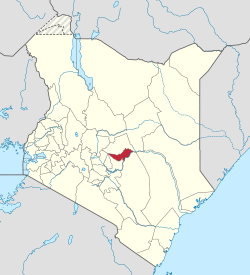Tharaka-Nithi County is one of the 47 counties of Kenya. It was created from Kenya's Eastern Province. The county has an area of 2609 km2 and as of the 2019 census a population of 393,177.[2]
Tharaka Nithi County | |
|---|---|
 Location of Tharaka-Nithi County in Kenya | |
| Coordinates: 0°18′S 38°0′E / 0.300°S 38.000°E | |
| Country | |
| Formed | 4 March 2013 |
| Capital | Kathwana |
| Government | |
| • Governor | Muthomi Njuki |
| Area | |
• Total | 2,609 km2 (1,007 sq mi) |
| Population (2019)[1] | |
• Total | 393,177 |
| • Density | 150/km2 (390/sq mi) |
| Time zone | UTC+3 (EAT) |
| Website | www |
Tharaka-Nithi County is home to the Chuka, Muthambi, Mwimbi and Tharaka subgroups of the Ameru community. The people of Tharaka-Nithi County are predominantly Christian, with Catholics, Presbyterians, and Methodists being the predominant religious communities.
The county consists of three constituencies: Maara, Chuka/Igambang'ombe, and Tharaka.
History
editIn 1992, Meru District was broken up into four new districts: Meru Central, Meru North, Meru South and Tharaka. Subsequently, Meru South, also known as Nithi, combined with Tharaka into the Tharaka-Nithi District. In 1998, the Tharaka-Nithi District was split into two districts, Nithi and Tharaka,[3] but a 2009 High Court decision declared that split unconstitutional and re-combined the two.[4] Subsequently, under the revised constitution of 2010, Tharaka-Nithi became a county.[5]
Economy
editLike other counties surrounding Mount Kenya, the primary economic activity in Tharaka-Nithi County is farming. Crops planted include tea and coffee in the higher areas of the county while sorghum, maize, green grams and millet in the low altitude areas. Dairy farming and fish farming are also practiced in the county.
Religion
editReligion in Tharaka-Nithi County[6]
| Religion (2019 Census) | Number |
|---|---|
| Catholicism | 108,266 |
| Protestantism | 172,266 |
| Evangelical churches | 70,043 |
| African-instituted churches | 18,749 |
| Orthodoxy | 2,656 |
| Other Christian | 9.114 |
| Islam | 724 |
| Hinduism | 9 |
| Traditionism | 251 |
| Other | 4,082 |
| No religion or atheism | 4.461 |
| Don't know | 615 |
| Not stated | 67 |
Prominent personalities
edit- Bernard Mate, politician; member of the Legislative Council and Parliament
- Muthomi Njuki, governor of Tharaka-Nithi County
- Kithure Kindiki, politician; Senator, and Cabinet Secretary of Interior and Administration of National Government
- Mzalendo Kibunjia, archaeologist and museum director
- James Ngugi, entrepreneur and economist
- Erastus Njoka, politician and former and founding vice chancellor of Chuka University.
- Peter K. Muriungi, the first and founding vice chancellor of Tharaka University.
See also
editReferences
edit- ^ "Kenya Census 2009 | PDF | Census | Waste Management".
- ^ "Kenya 2009 Population and Housing Census Highlights" (PDF). Kenya national Bureau of Statistics. Archived from the original (PDF) on 21 September 2010.
- ^ Sheila Aikman, Elaine Unterhalter: (2005) Beyond access: transforming policy and practice for gender equality in education. Oxfam, page 107.
- ^ Nyasato, Robert (5 September 2009). "High Court outlaws 210 districts created by Moi and Kibaki since 1992". The Standard. Archived from the original on 1 July 2014.
- ^ "First Scheduke, Article 6 (1)" (PDF). Constitution of Kenya (2010). p. 167. Archived (PDF) from the original on 14 March 2014.
- ^ "2019 Kenya Population and Housing Census Volume IV: Distribution of Population by Socio-Economic Characteristics" (PDF). Kenya National Bureau of Statistics. Retrieved 2 May 2021.

